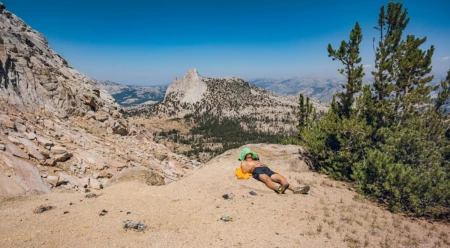Three Hours, Max: Underestimating a Run
The map showed an unbroken line contoured to the ridge. We started running along that line and ran past its end, into a space between two worlds. A few orange ribbons hung on branches in natural openings, marking what might eventually be the beginning of a trail. We followed it. When a gravel slope appeared that held no human footprints and no further orange ribbons, we decided to keep going. Maybe the trail lay uncut for only a short distance. Blind optimism, I think that’s called.
Forty-eight hours ago I was sitting at a worktable in The Forge, Patagonia’s Advanced R&D center. Machines thrummed their beautiful stop-motion song behind me—a wide-open succession of slightly syncopated mechanical ticks as the needle punched holes and the feed dogs pulled fabric. Six inches, stop. Six inches, stop. I love these machines. While I was in the middle of writing an email, Walker, who runs our field-testing program, tapped me on the shoulder to say he had a run in mind, a loop from his house to the river preserve—a place we’d both run hundreds of times. “There could be some bushwhacking,” he said. “But it should be two or three hours total.” I tell him, “Hell yeah, I’m in.”
That was then. Now I’m on my hands and knees gritting my teeth as thickets dig lines of red into all sides of my body except my stomach. Four hours have passed when I crawl out of the brambles into a small open space on the ridge, and I pause to collect myself. I’m nearly out of water, and the sip I take dries as it passes my tongue. I stare at the sun, then at my hands. We’re out of food and have been for a while. We stand and walk the few meters of open space before the brambles force us to our hands and knees again.
For the last mile of our bushwhack we follow a faint remembrance of a path. We can’t run, but we can walk without being bloodied any further by the malevolent foliage. Optimism sets back in, and then, at the end of this line, the thickest, harshest brambles of the day stand between us and the ragged end of the cut trail. They rise to two and a half times my height, impenetrably dense all the way to the ground. I climb into the brush and am immersed for 40 dark and tumultuous feet. And then, we’re free.
Eight and a half hours after starting our run, we stagger out of the brambles into a neighborhood and directly to a friend’s house nearby where a barbeque is about to begin. The bowls of fruit and dip still have coverings, and the house seems too clean. Without knowing what I’m doing, I stuff food into my mouth while Walker tells the story of our run. We both try not to bleed onto any of the furniture. The chaparral starts to recede slowly from memory, replaced by the realization that no matter how well you think you know a place, sometimes it brutally reminds you how much you still have to learn.
This story first appeared in the Spring 2018 Patagonia Catalog.

